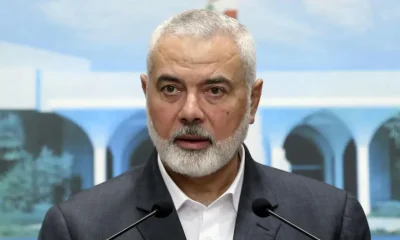WORLD NEWS
Killing of Hamas Leader Sparks Concerns of Iranian Retaliation and Threatens Gaza Negotiations

Israel warned that no Hamas leader was safe, but the assassination of the militant group’s political chief, Ismail Haniyeh, in Iran’s capital has shocked a region already hardened by war and conflict.
The strike, which Iran and Hamas have attributed to Israel, has intensified fears of an all-out war in the Middle East and dampened hopes for a cease-fire that could help end the devastating war in the Gaza Strip and secure the release of hostages still held there.
Iran has vowed vengeance after Haniyeh, 62, was killed in a raid on his home in Tehran, according to Hamas. Iran, a supporter of various militant groups like Hamas, is viewed by Israel as an existential threat.
There was no immediate comment or official confirmation from Israel, which typically does not acknowledge targeted assassinations. However, senior government official Amihai Eliyahu praised the killing on Wednesday, stating in a post on X that it had made “the world a little better.”
Israel and its allies will likely aim to contain the fallout from Haniyeh’s assassination and a related attack in Beirut to prevent a “full-fledged war” in the region, according to Nimrod Goren, a senior fellow for Israeli Affairs at the Middle East Institute in Washington, D.C.
“That will be the challenge in the coming days,” he said.
Bilal Saab, an associate fellow at Chatham House, a London-based think tank, and former U.S. Defense Department official, noted that while tensions appear to be rising, an all-out war between Iran and Israel is not necessarily inevitable.
“That is the ultimate paradox,” Saab said. “Neither Israel nor Iran wants a full-scale war.”
Both Hamas and Iran quickly blamed Israel for Haniyeh’s assassination, which came after Israel vowed to target Hamas leaders following the group’s Oct. 7 terror attack. Hamas and Iran have promised retaliation.
Iran’s Supreme Leader Ayatollah Ali Khamenei condemned the attack, saying on X that it had caused grief but also set the stage for severe punishment. Iranian President Masoud Pezeshkian, seen as a reformist open to improving relations with the West, also vowed retribution.
Tensions between Iran and Israel have been a constant since the 1979 Islamic Revolution in Iran, with Iran not recognizing Israel’s right to exist and supporting militant groups in the region, including Hezbollah in Lebanon and the Houthis in Yemen.
On Tuesday, Israel killed a senior Hezbollah commander in Beirut, accusing him of being responsible for a recent rocket attack that killed 12 children in the Israeli-occupied Golan Heights.
Mohamed Ali al-Houthi of Yemen’s Supreme Political Council warned that Haniyeh’s assassination could escalate tensions further. Yemen’s Houthi rebels have launched attacks on Red Sea shipping and claimed responsibility for a recent drone strike in Tel Aviv.
Haniyeh’s assassination comes amid heightened Israel-Iran tensions, including Israeli strikes in Iran and a retaliation that destroyed Iran’s consulate in Syria, killing key figures in the Islamic Revolutionary Guard Corps.
Haniyeh’s death also complicates efforts to free hostages taken on Oct. 7. Qatari Prime Minister Sheikh Mohammed bin Abdulrahman Al Thani questioned the possibility of successful mediation when one side’s negotiator is killed.
While the U.S. has not publicly criticized Israel for the attack, Secretary of State Antony Blinken emphasized the importance of negotiations and a cease-fire, stating it was crucial to help Palestinians in Gaza and secure the release of hostages.
The Hostages and Missing Families Forum urged continued efforts to secure a deal and bring back all hostages, acknowledging that the implications of the latest developments were still unclear.
There are concerns that Haniyeh’s assassination could significantly disrupt cease-fire negotiations between Israel and Hamas. Months of talks have yet to yield an agreement, leaving hundreds of thousands of displaced Palestinians in Gaza to endure the ongoing conflict, which has already claimed more than 39,000 lives.

















You must be logged in to post a comment Login